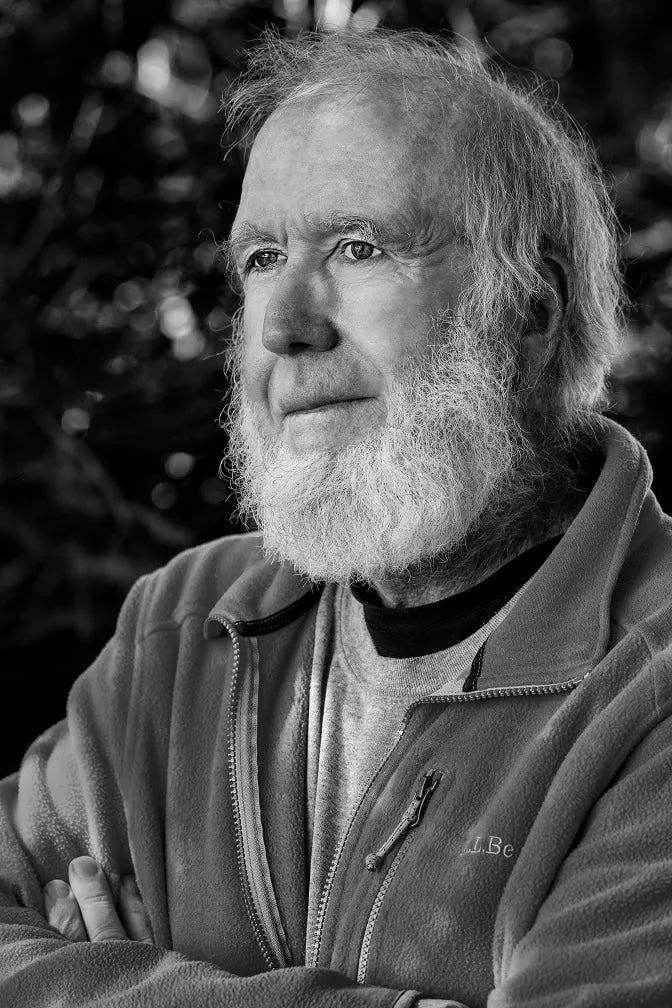Kevin Kelly
Kevin Kelly (Cmichel67 CC BY-SA 4.0)
Fine portrait of an interesting man. See today’s Long Read.
Quote of the Day
”Just a little more reverence, please, and not so much astonishment.”
(Sir) Malcolm Sargent, admonishing a choir rehearsing Handel’s ‘For Unto Us a Child is Born”.
Musical alternative to the morning’s radio news
Shaun Davey | Liam O’Flynn | Newfoundland
I know I’ve linked to this in the past, but it’s one of my favourite pieces. It is St Patrick’s Day, after all. And Liam was the greatest piper of my lifetime.
Long Read of the Day
Interview: Kevin Kelly, editor, author, and futurist
Kevin Kelly, who has been around even longer than I have, is an acquired taste for some. But I’ve always enjoyed reading him even when I thought he was wrong. This long and unfailingly interesting conversation between him and Noah Smith is good value.
This is how Noah introduces it:
Essentially, if you look at the fast-changing world of technology and you ask “Where is this all headed?”, and “Where should this all be headed?”, then Kevin Kelly is a natural person to ask. And in the interview that follows, that is basically what I asked him. I especially focused on his idea of the “technium”, which is all of human technology acting together as a single natural system or organism. We talk about whether this technium exists in competition with Earth’s natural environment, or whether the two can exist in harmony. We also discuss AI, social media crypto, and we talk about whether and how technological development can be actively steered. He also dispenses a bit of helpful life advice.
The interview itself is interesting throughout. Kelly’s idea of the ‘technium’ has always seemed a bit wacky to me (it invariably reminds me of Langdon Winner’s question about whether artefacts have politics) but his exposition of it here is entertaining and thoughtful. Running through the whole piece is his incurable techno-optimism. But then that was always his trademark.
His observations on machine-learning are right on the money, though.
Nonetheless, right now machine learning is overhyped. It is not sentient, and not as smart as it seems. What we are discovering is that many of the cognitive tasks we have been doing as humans are dumber than they seem. Playing chess was more mechanical than we thought. Playing the game Go is more mechanical than we thought. Painting a picture and being creative was more mechanical than we thought. And even writing a paragraph with words turns out to be more mechanical than we thought. So far, out of the perhaps dozen of cognitive modes operating in our minds, we have managed to synthesize two of them: perception and pattern matching. Everything we’ve seen so far in AI is because we can produce those two modes. We have not made any real progress in synthesizing symbolic logic and deductive reasoning and other modes of thinking. It is those “others” that are so important because as we inch along we are slowly realizing we still have NO IDEA how our own intelligences really work, or even what intelligence is. A major byproduct of AI is that it will tell us more about our minds than centuries of psychology and neuroscience have.
Anyway, that’s enough from me. Read it yourself and ponder. I hope you enjoy it.
Small earthquake in Silicon Valley: not many dead
My Observer column next Sunday takes a sardonic view of what happened to the Valley’s favourite bank. But in the meantime Dave Karpf’s Three thoughts on Silicon Valley Bank will keep you entertained.
The myth of Silicon Valley is that it is a font of innovation, the place where the future is being invented. I’ve written before about the underlying ideological project here — in which the inventors, entrepreneurs, engineers and investors are the heroic change-makers, while governments, regulators, and existing institutions are obstacles to be overcome or villains to be defeated. There’s something galling about just how… reduced the whole phenomenon has been by the simple act of interest rates rising. It’s a real Wizard of Oz moment… Really? Low interest rates? Is that all this has ever been?
It’s a nice piece. Insightful too about how Peter Thiel basically pulled the plug on the bank.
My commonplace booklet
This is crass, but also oddly impressive. Landing a plane on a helipad atop an unspeakable hotel.




